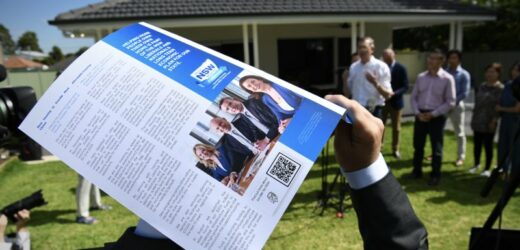NSW election 2023
The Duke of Wellington once summarised his genius as a soldier and Tory British prime minister with simplicity: “All the business of war, indeed all the business of life, is to endeavour to find out what you don’t know from what you do: that is what is called ‘guessing what’s on the other side of the hill’.”
No guessing, though, was required on Saturday. We know that the Coalition lost, which was hardly surprising after 12 years and, realistically, so many scandals.
The Coalition held power for nine years federally and 12 years in NSW – and did nothing, at all, to expand the supply and affordability of housing, especially for younger people.Credit:Joe Amaro
What we also know is the most important fact in Australian politics today: that NSW Labor never split in the 1950s. This means that Labor in NSW is more sensible than Labor elsewhere and can often outflank “wet” Liberals on conservative issues such as law and order and, in this campaign, energy.
I suspect the Iron Duke would agree that one of the advantages of my living in federal teal territory is I can see, clearly, my own side of the hill – and that the Coalition’s main electoral problem remains housing.
Voting in Warringah involves queuing with affluent over-60s landlords who hold their teal “how to vote” card with flyers from nearby apartment showings. The teal movement, at polling place level, is NIMBYism blended with oat milk lattes, aimed at stopping new housing supply in Sydney’s affluent north and east. One can understand why Boomers would vote teal to protect their often highly leveraged investments. But why any young person would vote for NIMBY teals and Greens, only to enrich their landlord, is mystifying.
Former premier Dominic Perrottet visiting a Peakhurst first home buyer on the campaign trail.Credit:SMH
To continue Wellington’s metaphor, Saturday also saw what was “on the other side of other electoral hills” in seats such as East Hills, Parramatta and Ryde, where Labor took suburban seats from the Liberals, who look likely to cling to Winston Hills despite a 5 per cent swing against them. Menzies’ “forgotten people” did not forget to exact their revenge on the Liberals who had forgotten them.
These different “electoral envelopment” attacks from the Left by Labor, and from the NIMBY fringes by the teals, means the Coalition is electorally ambushed by a problem entirely of its own making: the lack of home ownership by under-50s in Greater Sydney. Yes, under 50s.
Right-of-centre politics, morally as well as electorally, has always depended on delivering ever more security to individuals and families in their lives, their homes and, yes, their finances. Yet, the Coalition held power for nine years federally and 12 years in NSW, and did nothing, at all, to expand the supply and affordability of housing, especially for younger people. The Coalition’s vote in once “safe” federal and state seats has fallen as home ownership rates have fallen.
The lesson of the past two years’ successive electoral Waterloos is that the Coalition has to learn, as Wellington did when prime minister himself, that state power must be wielded to ensure that more and more people have a stake in the society.
One of the advantages of living in teal territory is I can see, clearly, my own side of the hill – and that the Coalition’s main electoral problem remains housing.Credit:SMH
Wielding power means deploying federal cudgels (not mere carrots or sticks) against the sclerotic states who make decisions on land supply and usage. A future federal Coalition government must require all states (using necessarily punitive reforms to GST funding and the grants power in Section 96 of the Constitution) to release more land for housing.
Wielding power means, also, reforming the Reserve Bank. The RBA’s entrenched policy of fixing historically low interest rates has fuelled real estate bubbles throughout Sydney and elsewhere. The meagre savings of young workers earn little interest, and what few properties were once in their reach just skyrocket beyond their potential deposit. The RBA’s objects must be reformed to include conservative objectives: the pricing of money to reward thrift and punish speculation – and, yes, force sanity on housing markets.
Wielding power means, finally, advancing a constitutional amendment limiting state parliaments to three-year terms. The idea that state parliamentarians can answer to lobbyists’ needs every day, but only have to answer their own voters’ needs on one Saturday every four years, is absurd. Housing and other local cost of living issues are why state parliamentarians, especially, should be on the shortest electoral leashes.
Above all, the Right of politics has to accept that the “invisible hand” is a Liberal delusion that has been amputated by the electoral sabres that killed the supine Coalition governments that failed to help the “forgotten people” into their own homes.
The Duke of Wellington was fond of saying, “Wise people learn when they can; fools learn when they must.”
Wisely or foolishly, I must again repeat for a repeatedly defeated Coalition: there is no future for conservative politics if more people, especially younger people, have nothing of their own to conserve.
Gray Connolly is a Sydney barrister and writer.
The Opinion newsletter is a weekly wrap of views that will challenge, champion and inform your own. Sign up here.
Most Viewed in Politics
From our partners
Source: Read Full Article





